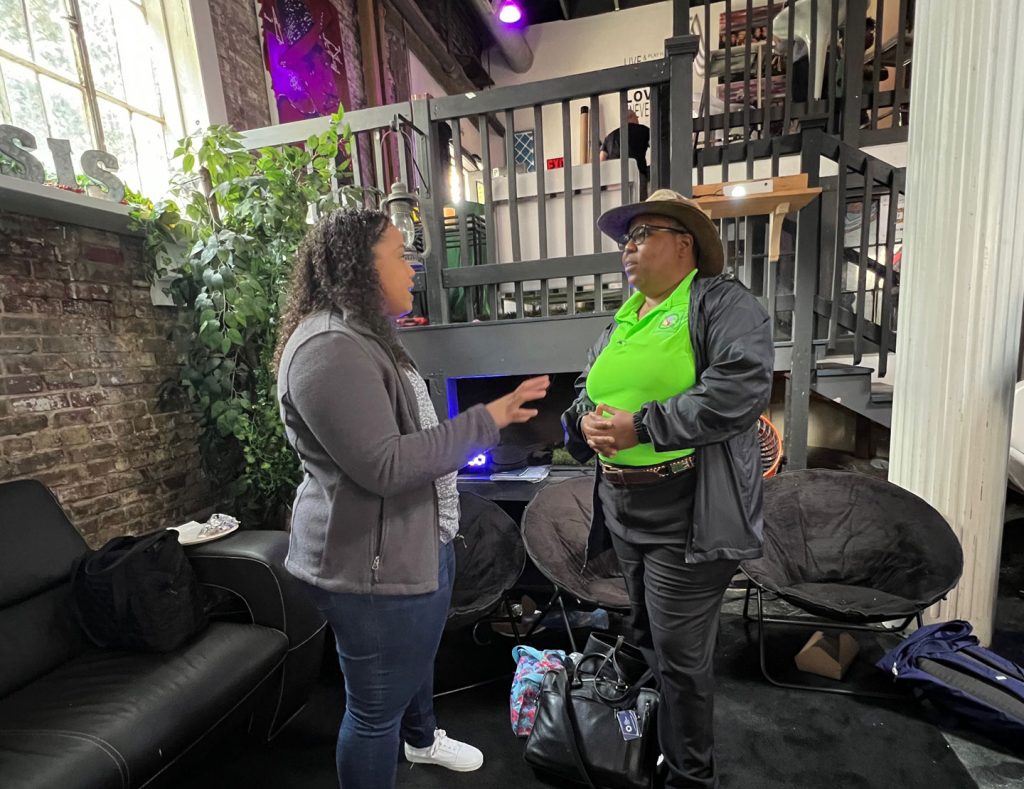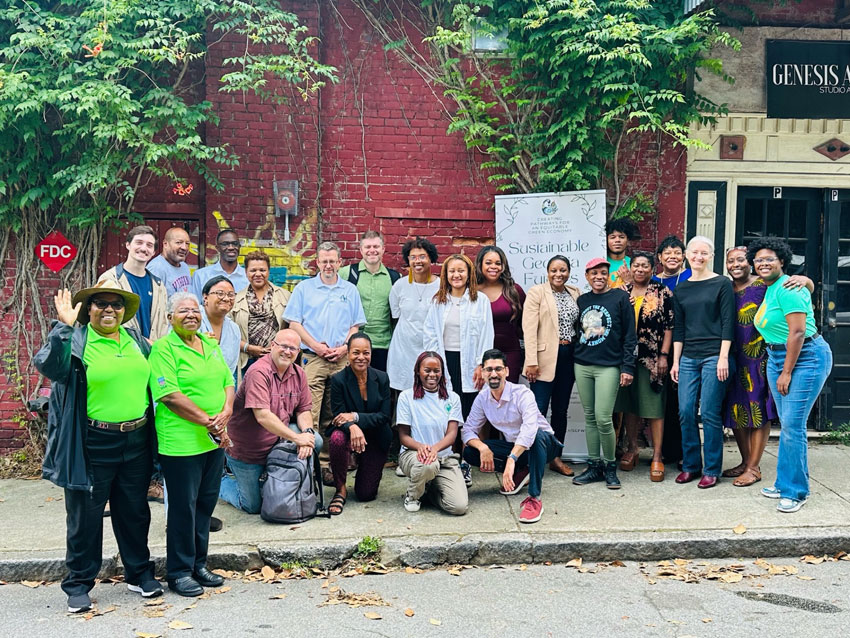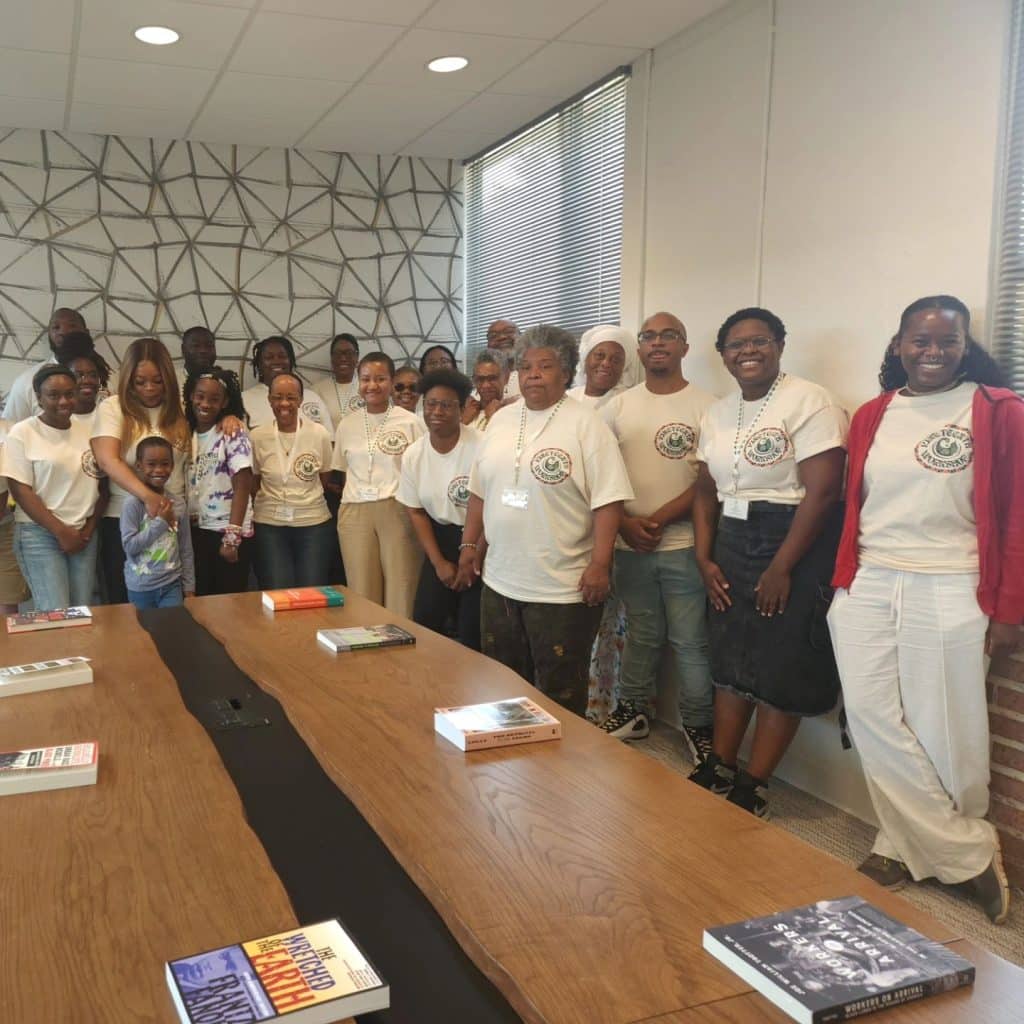Organizing
SGF seeks to address two of our nation’s crises: climate change and systemic racism. We address these crises through two key strategies, 1) relational organizing, and 2) creating viable pathways for Black communities and communities of color to access green economy education, jobs, and entrepreneurship.

Our Organizing Praxis
At Sustainable Georgia Futures, we believe:
In an effort to grow relational trust, build people power, and encourage just transition, we are focusing on two major projects: the WeatheRISE ATL campaign and the Sankofa Community Issue Assembly. Find out more about each campaign below.
WeatheRISE ATL Campaign
The purpose of WeatheRISE ATL is to reduce energy burden on households in Atlanta’s highest energy-burdened areas through energy efficiency retrofits. The benefits to this program include the preservation of naturally occurring affordable housing, a decrease in carbon emissions, improved health outcomes, and workforce development opportunities through the delivery of energy-efficient home environments.

This pilot program will roll out in three phases or service components
01
Outreach, Intake, Education, and Customer Service – Sustainable Georgia Futures
02
On-site delivery of Energy Efficiency Audits and Interventions – Revaule.io
03
Data Processing, Analysis and Reporting – Greenlink Analytics For more information, please see the City of Atlanta’s WeatheRISE ATL website (link coming soon).
Building Momentum: Highlights from Past Organizing Events
Juneteenth Three Day Organizing
- In June 2024
- Three Day Event
Celebrate progress and resilience with Sustainable Georgia Futures! From June 14th to June 16th, SGF hosted its inaugural Juneteenth Environmental Justice Organizing Workshop—a three-day gathering of passionate advocates dedicated to equity and sustainability. Participants explored the history of the Environmental Justice Movement, honed their skills in relational organizing through 1-1 conversations and house meetings, and learned strategies for building power in their communities. Through interactive workshops, group discussions, and hands-on activities, attendees connected with like-minded individuals and left inspired to lead transformative change. Together, we took bold steps toward justice and sustainability in the South!

Sankofa Community Issue Assembly
The Sankofa Community Issue Assembly is an assembly that will help us identify one to two community issues that are most deeply and widely felt. Following a series of house meetings where we discuss the issues closest to our families and communities, we will build county leadership teams and teams for research actions based on the issues that arise.
SGF’s ultimate goal is to build environmental climate justice leadership teams in the following target counties: Fulton, Dekalb, Clayton, Gwinnett, Cobb, Bibb, Chatham, Richmond, Dougherty, Muscogee and Lowndes counties. These leadership teams, in tandem with the people power built through house meeting fellowship, will help out communities in Georgia build toward the just and equitable future we deserve.
Stop Cop City Teach
- In March 2023
- Climate Justice Education Meeting
This is a three-day organizing workshop that help organizers and participants learn relational organizing methods and how to develop and win campaigns. Our focus examines power and organizing in the South–especially as it pertains to race. We focus the key element of building relational trust within communities.
Labor Research Action Network
- 2023 Conference
- Georgetown University - Washington DC
American History, Race, Prison, and Surveillance: Atlanta’s Cop City, Extractive Economies and Amazon’s Culture of Surveillance
The line between state and corporate surveillance has frequently been a porous one for Black communities and other communities of color. Surveillance is one example of a carceral technology used to maintain social control and punish whether wielded by American governments or employers. At Sustainable Georgia Futures (“SGF”), we see caste at work in carceral systems like policing and state surveillance. For this presentation, we examine this system as it pertains to the modern-day development of Atlanta’s Public Safety Training facility, Cop City. Tyre Nichol’s murder initially prompted renewed interest in stopping the years-long development of Cop City, but fervor around the issue ignited following the death of Manuel “Tortuguita” Teran a few weeks later. With Cop City, we need to do a deeper examination of the historical systems and policies of extraction at play.
Amazon has an active hand in the development of Cop City and demonstrates the false division between state and corporate surveillance. The surveillance practices in Amazon fulfillment centers is part of a long history of monitoring workers which goes back to the American plantation. This workshop co-hosted by SGF and the Athena Coalition will provide historical context to the current policies used to maintain an extractive caste system. We will then provide an overview of the systems at play in Atlanta’s Cop City and the experiences of workers in Amazon and conclude with house meetings (small group discussions) and a debrief.
- Sustainable Georgia Futures (“SGF”) • Adrienne Rice, SGF
• Ty Wilson, SGF - Beth Gutelius, University of Illinois, Chicago
- Chenay Arberry, United for Respect
- Gabrielle Rejouis, United for Respect/Athena Coalition


